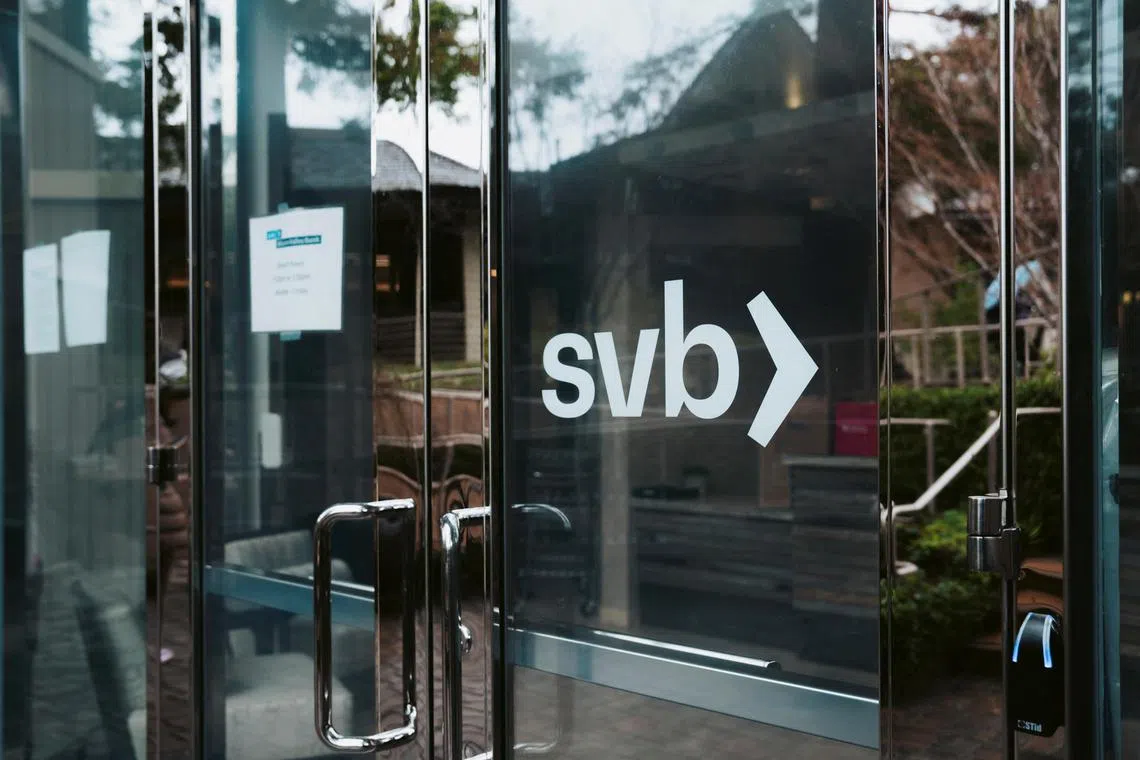Silicon Valley Bank shutdown sends shockwaves through US start-up community
Sign up now: Get ST's newsletters delivered to your inbox

Silicon Valley Bank was seeking a sale, and trading in its shares was halted after they plummeted 60 per cent late on Thursday.
PHOTO: REUTERS
SILICON VALLEY – The sudden collapse of Silicon Valley Bank (SVB) on Friday sent shockwaves through the start-up community, which had come to view the lender as a source of reliable capital, particularly for some of tech’s biggest moonshots.
SVB Financial Group, the parent of the start-up-lender, was shuttered by California banking regulators on Friday in a bid to protect depositors following a dive in the value of its investment holdings
The bank was seeking a sale, sources told Reuters, and trading in its shares was halted after they plummeted 60 per cent late on Thursday.
At some California branch locations, depositors gathered early on Friday to try to get their cash out, fearing it could be inaccessible in the coming days. At some sites, the doors were locked and cursory notes were found advising customers to try elsewhere. At a branch in Menlo Park, California, customers were greeted by a taped-up press release announcing that the bank had moved into receivership and would be known as Deposit Insurance National Bank of Santa Clara.
The bank had been central to the formation of many early-stage companies due to its reputation for taking bets on start-ups that might have had little chance of survival otherwise and for which larger banks might find far too risky. It had had financial relationships with a who’s who of Silicon Valley firms over the years, including Snapchat’s parent Snap Inc.
Snap declined to comment.
The full extent of the fallout from the bank’s crash could take weeks or months to gauge and might presage a period of more cautious investing in technology start-ups.
An SVB spokesman did not immediately respond to a request for comment sent on Friday.
Uncertainty swept through Silicon Valley as start-up founders and venture capital firms worried that they could, among other things, fail to make payroll.
The Federal Deposit Insurance Corporation (FDIC) said on Friday that insured depositors would regain access to their deposits no later than Monday, when branches reopen under the control of the regulator.
Mr Parker Conrad, chief executive of HR platform Rippling, said on Twitter he had learnt that some of his customers’ employee payments were being delayed and that, as a result, he had moved processing to JPMorgan Chase.
“FDIC involvement makes us sceptical of the assurances we are getting from SVB,” wrote Mr Conrad.
Cato Digital CEO Dean Nelson was in a line outside SVB’s Santa Clara headquarters, hoping to get answers. He said he was worried about his company’s ability to pay employees and cover expenses.
“Access to the cash is the biggest problem for the majority of the companies here. If you are a start-up, cash is king. The cash and the workflow; to be able to have the runway is critical.”
The speed of the bank’s precipitous decline caught the start-up community by surprise.
Ms Ashley Tyrner, CEO of start-up FarmboxRx, was on vacation with her family in Costa Rica on Thursday afternoon when she said she started getting frantic text messages from her co-founder, who had initiated an eight-figure wire transfer, completely emptying their SVB account.
Ms Tyrner said she wondered if her co-founder had gone mad. She said her partner texted: “SVB is going under. We have to get our funds out. Please approve this wire.“
Ms Tyrner was thwarted when she discovered that the bank’s website was not working. “My heart stopped,” she said.
As at Friday, FarmboxRx’s funds were still tied up with the bank. “‘My bank is going to go under’ had never crossed my mind,” she said.
The fate of Silicon Valley Bank cast new doubts on the funding environment just as some bright spots were emerging, particularly artificial intelligence, amid the grim fallout of 2022 that led many tech companies to trim jobs and pare back spending on riskier projects.
Mr Arjun Sethi, co-founder of venture firm Tribe Capital, sent a sobering note to clients on Friday that he shared on social media. “The venture ecosystem is wandering in the desert. Liquidity is dry,” he wrote.
“Hold your assets in the most liquid traditional banks, and do not take unnecessary risks.” REUTERS


